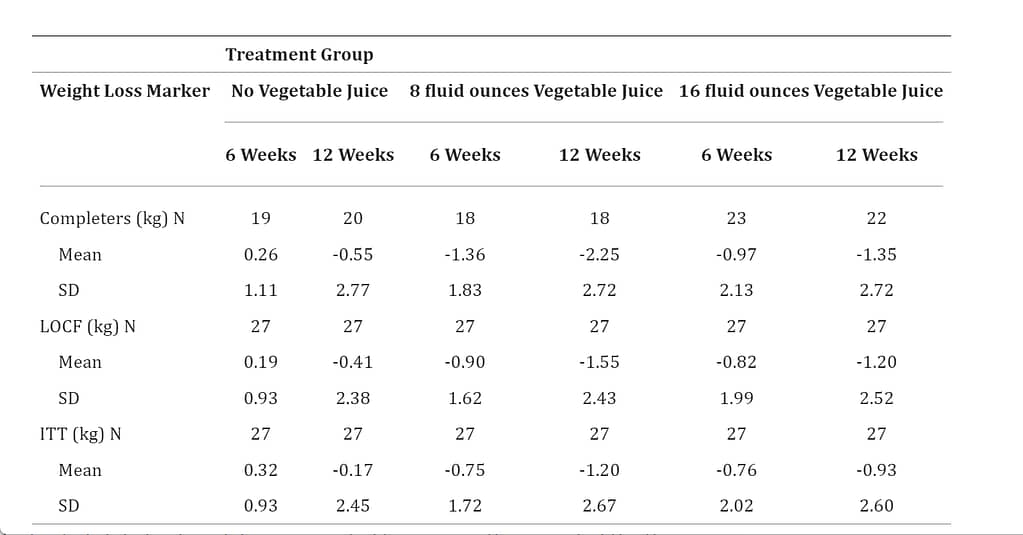Are you struggling to shed those stubborn pounds despite your best efforts? If so, you’re not alone. Those with insulin resistance and metabolic syndrome may find it especially difficult losing weight with insulin resistance. But there’s still hope. In a groundbreaking study by leading experts, including Sonia F. Shenoy and Walker S.C. Poston, a remarkable solution emerged – the DASH diet combined with low-sodium vegetable juice. Imagine being able to take back control of your health and finally escaping the bonds of excess weight. Come learn about the approach’s transformative potential and discover tried-and-true methods to help you with losing weight with insulin resistance.
Key Takeaways
Prior to getting into the details, let’s emphasise some important lessons learned:
- Promising outcomes in supporting losing weight with insulin resistance have been observed with the DASH diet, which is well-known for its efficiency in reducing blood pressure.
- Vegetable juice with low sodium content balances the DASH diet by offering vital nutrients without raising blood sodium levels.
- Individuals with insulin resistance can benefit significantly from this combined approach, experiencing not only weight loss but also improvements in metabolic health.
- To help you overcome typical challenges related to insulin resistance and expedite your weight loss journey, Hotel Weight Loss offers customised guidance and creative keto diet suggestions.
Table of Contents
Losing Weight with Insulin Resistance: Understanding Insulin Resistance and Weight Loss
One of the main characteristics of metabolic syndrome is insulin resistance, which is characterised by high blood sugar levels brought on by the body’s cells losing their sensitivity to the insulin signal. In addition to encouraging weight gain, this metabolic inefficiency raises the risk of major illnesses like type 2 diabetes and cardiovascular disease. Losing weight with insulin resistance can prove rather difficult.
The Role of Insulin in Weight Management
Insulin is essential for controlling the metabolism of glucose and the storage of energy. When it’s working at its best, it makes it easier for cells to take up glucose and produce energy. However, in individuals with insulin resistance, this process is disrupted, resulting in excess glucose circulating in the bloodstream and ultimately contributing to weight gain. This makes the act of losing weight with insulin resistance incredibly tough and complicated.

Breaking the Cycle: The DASH Diet Approach
The Dietary Approaches to Stop Hypertension (DASH) diet emphasises whole foods rich in fruits, vegetables, lean proteins, and low-fat dairy while limiting sodium, saturated fats, and refined sugars. By promoting nutrient-dense, balanced meals, the DASH diet helps regulate blood sugar levels, reduce inflammation, and encourage efforts towards the fastest way to lose weight with insulin resistance.
Supercharging Your Weight Loss with Low Sodium Vegetable Juice
Incorporating low-sodium vegetable juice into your daily routine can provide a convenient and nutritious way to enhance the effects of the DASH diet. Packed with vitamins, minerals, and antioxidants, such as potassium and vitamin C, vegetable juice promotes satiety, hydration, and overall well-being without the added sodium found in many commercial beverages.
Overcoming Challenges and Plateaus
While embarking on your weight loss journey with insulin resistance, you may encounter various challenges and plateaus. These roadblocks can be frustrating, but they’re not insurmountable. By staying committed to your goals, seeking support from healthcare professionals, and exploring innovative strategies like the DASH diet and low sodium vegetable juice, you can navigate these obstacles with confidence and resilience.
Facts and Figures
Find below a table summarising the overall information collected from this study. It shows the results of losing weight with insulin resistance.

Credit: https://www.ncbi.nlm.nih.gov/pmc/articles/PMC2841082/table/T2/?report=objectonly
Conclusion
In conclusion, losing weight with insulin resistance is possible with the right approach and support. The DASH diet combined with low-sodium vegetable juice offers a scientifically proven solution to help you achieve lasting weight loss and improve your metabolic health. As you embark on this transformative journey, remember that you’re not alone. Hotel Weight Loss is here to provide personalised guidance, innovative keto diet ideas, and unwavering support every step of the way. Contact us today to learn more and take the first step towards a healthier, happier you.
FAQs
How does insulin resistance affect weight loss?
Insulin resistance disrupts the body’s ability to regulate blood sugar levels, leading to increased fat storage and difficulty losing weight. By adopting strategies that improve insulin sensitivity, such as the DASH diet and low-sodium vegetable juice, individuals can overcome these challenges and achieve successful weight loss.
Can the DASH diet help with insulin resistance?
Yes, the DASH diet has been shown to improve insulin sensitivity and support weight loss efforts, making it a valuable tool for individuals with insulin resistance. By emphasising whole foods rich in nutrients and minimising sodium intake, the DASH diet helps regulate blood sugar levels, promote metabolic health, and act as the fastest way to lose weight with insulin resistance.
How does low-sodium vegetable juice aid in weight loss?
Low-sodium vegetable juice is an excellent addition to the DASH diet, providing essential nutrients and hydration without the excess sodium found in many commercial beverages. By incorporating vegetable juice into your daily routine, you can enhance satiety, support hydration, and promote overall well-being, facilitating weight loss.
What role does Hotel Weight Loss play in overcoming insulin resistance?
Hotel Weight Loss offers personalised support and innovative keto diet ideas tailored to individuals with insulin resistance. Our team of health specialists understands the unique challenges associated with this condition and provides comprehensive guidance to help clients achieve their weight loss goals and improve metabolic health.
How long does it take to see results with the DASH diet and low-sodium vegetable juice?
The timeline for seeing results may vary depending on individual factors such as starting weight, metabolic health, and adherence to the program. However, many individuals experience significant improvements in weight and metabolic markers within a few weeks of adopting the DASH diet and incorporating low-sodium vegetable juice into their routine.
Can Hotel Weight Loss assist with overcoming weight loss plateaus?
Yes, Hotel Weight Loss offers personalised support and strategies to help clients overcome weight loss plateaus and achieve continued success. Our team of health specialists works closely with clients to identify potential barriers, adjust their approach, and provide ongoing motivation and encouragement throughout their journey.
Is the DASH diet suitable for everyone, including those with insulin resistance?
While the DASH diet can be beneficial for many individuals, it’s essential to consult with a healthcare professional before making any significant dietary changes, especially if you have insulin resistance or other underlying health conditions. A personalised approach tailored to your individual needs and preferences is key to long-term success
How can I incorporate low-sodium vegetable juice into my daily routine?
You can enjoy low-sodium vegetable juice as a refreshing beverage on its own or incorporate it into smoothies, soups, or salad dressings for added nutrition and flavor. Experiment with different vegetable combinations to find your favorite flavors and discover creative ways to incorporate vegetable juice into your meals and snacks.
Does Hotel Weight Loss offer virtual consultations for remote clients?
Yes, Hotel Weight Loss offers virtual consultations for clients who prefer remote support or are unable to visit our physical location. Our team utilises telehealth technology to provide personalised guidance, monitor progress, and offer ongoing support to clients regardless of their location.
How can I get started with Hotel Weight Loss?
Getting started with Hotel Weight Loss is easy – contact us to schedule a consultation with one of our health specialists. During your consultation, we’ll discuss your goals, assess your current health status, and develop a personalised plan to help you achieve lasting weight loss and improved metabolic health.
Ready to kickstart your weight loss journey and conquer insulin resistance? Visit Hotel Weight Loss to consult with our team of health specialists and explore personalised strategies to accelerate your progress. Don’t let insulin resistance hold you back – reclaim control of your health and vitality today!
References
Shenoy SF, Poston WS, Reeves RS, Kazaks AG, Holt RR, Keen CL, Chen HJ, Haddock CK, Winters BL, Khoo CS, Foreyt JP. Weight loss in individuals with metabolic syndrome given DASH diet counseling when provided a low sodium vegetable juice: a randomized controlled trial. Nutr J. 2010 Feb 23;9:8. doi: 10.1186/1475-2891-9-8. PMID: 20178625; PMCID: PMC2841082.
Sacks, F. M., Svetkey, L. P., Vollmer, W. M., Appel, L. J., Bray, G. A., Harsha, D., … & Karanja, N. M. (2001). Effects on blood pressure of reduced dietary sodium and the Dietary Approaches to Stop Hypertension (DASH) diet. New England Journal of Medicine, 344(1), 3-10.
Appel, L. J., Moore, T. J., Obarzanek, E., Vollmer, W. M., Svetkey, L. P., Sacks, F. M., … & Kennedy, B. M. (1997). A clinical trial of the effects of dietary patterns on blood pressure. New England Journal of Medicine, 336(16), 1117-1124.
Obarzanek, E., Sacks, F. M., Vollmer, W. M., Bray, G. A., Miller, E. R., Lin, P. H., … & Karanja, N. M. (2001). Effects on blood lipids of a blood pressure–lowering diet: the Dietary Approaches to Stop Hypertension (DASH) Trial. American Journal of Clinical Nutrition, 74(1), 80-89.
Jenkins, D. J. A., Wolever, T. M. S., Taylor, R. H., Barker, H., Fielden, H., Baldwin, J. M., … & Goff, D. V. (1981). Glycemic index of foods: a physiological basis for carbohydrate exchange. The American Journal of Clinical Nutrition, 34(3), 362-366.



